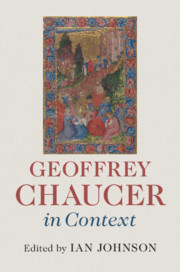Book contents
- Geoffrey Chaucer in Context
- Geoffrey Chaucer in Context
- Copyright page
- Contents
- Illustrations
- Contributors
- Abbreviations
- Introduction
- Part I Chaucer as Context
- Part II Books, Discourse and Traditions
- Part III Humans, the World and Beyond
- Part IV Culture, Learning and Disciplines
- Part V Political and Social Contexts
- Part VI Chaucer Traditions
- Further Reading
- Index
Part II - Books, Discourse and Traditions
Published online by Cambridge University Press: 24 June 2019
- Geoffrey Chaucer in Context
- Geoffrey Chaucer in Context
- Copyright page
- Contents
- Illustrations
- Contributors
- Abbreviations
- Introduction
- Part I Chaucer as Context
- Part II Books, Discourse and Traditions
- Part III Humans, the World and Beyond
- Part IV Culture, Learning and Disciplines
- Part V Political and Social Contexts
- Part VI Chaucer Traditions
- Further Reading
- Index
Summary
Thomas Hoccleve referred to Chaucer as the ‘firste fyndere of our faire langage’. The word fyndere is carefully chosen, as a modified translation of the first ‘canon’ of classical and medieval rhetoric, the ancestor of present-day English invention. Any assessment of Chaucer’s ‘poetic art’ requires us not just to identify the linguistic choices available to him, it also requires us to ask how those choices relate to his broader poetics. Chaucer’s use of ‘pronouns of power’, for example, do not only characterise particular choices from the linguistic resources of London Middle English, they are also a matter of style, a notion for which classical and medieval literary theoreticians had their own terminology, distinguishing high, middle and low styles, widely recognised as having distinct functions relating to social status and roles. It is conceivably as a metrist, however, that Chaucer’s skill as a ‘finder’ is perhaps most subtly demonstrated, as examples from his works show.
Keywords
- Type
- Chapter
- Information
- Geoffrey Chaucer in Context , pp. 25 - 154Publisher: Cambridge University PressPrint publication year: 2019

